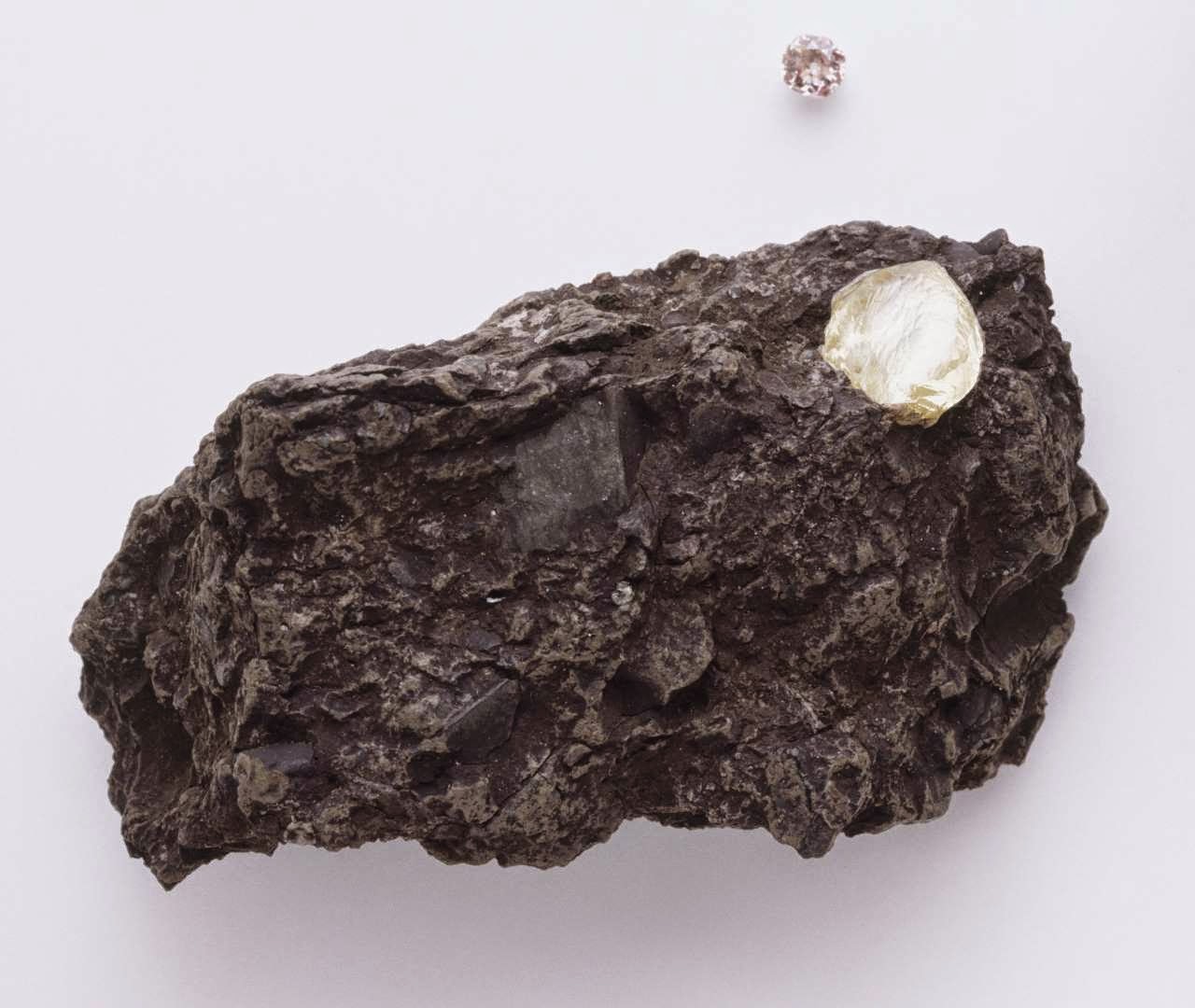Strange rock containing 30,000 diamonds baffles science and the geologists.
Credit: Getty Images
When Russian miners pulled a strange red and green stone out of the ground, they immediately knew it was different to the thousands of tons of ore they process every day.
In fact, what workers at Alrosa 's Udachnaya diamond mine had unearthed was a 30mm rock that contained 30,000 diamonds, a concentration 1M times higher than normal.
However, despite the rare find the company donated the rock to the Russian Academy of Sciences, as the diamonds are so small that they cannot be used as gems.
After scanning the rock with X-rays, scientists found that the diamonds inside measure just 1mm and are octahedral in shape - similar to two pyramids stuck together at the base.
The red and green colouring comes from larger crystals of garnet, olivine and pyroxene.
"The exciting thing for me is there are 30,000 itty-bitty, perfect octahedrons, and not one big diamond," said Larry Taylor, a geologist at the University of Tennessee, who presented the findings at the American Geophysical Union 's annual meeting.
"It's like they formed instantaneously. This rock is a strange one indeed."
Scientists are excited at the finding as they hope it will shed further light on how diamonds are made.
They know diamonds are crystals of pure carbon that form under crushing pressures and intense heat, mostly formed in the Earth's mantle, the layer beneath the crust or surface layer, at a depth of about 150km. However, certain processes in their creation remain a mystery.
"The [chemical] reactions in which diamonds occur still remain an enigma," Mr Taylor told Live Science, which first reported the story.
Mr Taylor works with researchers at the Russian Academy of Sciences to study Udachnaya diamonds.
Russia is the largest diamond-producing country in the world, and produced more than 33m carats last year.
State-controlled Alrosa is the world's leading diamond miner, accounting for 99pc of Russia’s output and 27pc of global production. Its sees rough diamond revenues of more than $4bn a year.
Last week Alrosa signed a dozen deals with Indian buyers to increase direct deliveries to Asia's third-largest economy.
The firm earns half of its revenue, or around $2.5bn, from Indian-funded clients, and the deal could help Russia reduce risks linked to Western sanctions imposed over its role in the Ukraine crisis.
Last month Alrosa revealed a 10.5bn rouble (£110m) loss for its third quarter despite sales rising 7.6pc.
The Udachnaya mine, in the Sakha Republic, just outside the Arctic circle, is more than 600 metres deep, making it the third deepest open-pit mine in the world.
Credit: Getty Images
When Russian miners pulled a strange red and green stone out of the ground, they immediately knew it was different to the thousands of tons of ore they process every day.
In fact, what workers at Alrosa 's Udachnaya diamond mine had unearthed was a 30mm rock that contained 30,000 diamonds, a concentration 1M times higher than normal.
However, despite the rare find the company donated the rock to the Russian Academy of Sciences, as the diamonds are so small that they cannot be used as gems.
After scanning the rock with X-rays, scientists found that the diamonds inside measure just 1mm and are octahedral in shape - similar to two pyramids stuck together at the base.
The red and green colouring comes from larger crystals of garnet, olivine and pyroxene.
"The exciting thing for me is there are 30,000 itty-bitty, perfect octahedrons, and not one big diamond," said Larry Taylor, a geologist at the University of Tennessee, who presented the findings at the American Geophysical Union 's annual meeting.
"It's like they formed instantaneously. This rock is a strange one indeed."
Scientists are excited at the finding as they hope it will shed further light on how diamonds are made.
They know diamonds are crystals of pure carbon that form under crushing pressures and intense heat, mostly formed in the Earth's mantle, the layer beneath the crust or surface layer, at a depth of about 150km. However, certain processes in their creation remain a mystery.
"The [chemical] reactions in which diamonds occur still remain an enigma," Mr Taylor told Live Science, which first reported the story.
Mr Taylor works with researchers at the Russian Academy of Sciences to study Udachnaya diamonds.
Russia is the largest diamond-producing country in the world, and produced more than 33m carats last year.
State-controlled Alrosa is the world's leading diamond miner, accounting for 99pc of Russia’s output and 27pc of global production. Its sees rough diamond revenues of more than $4bn a year.
Last week Alrosa signed a dozen deals with Indian buyers to increase direct deliveries to Asia's third-largest economy.
The firm earns half of its revenue, or around $2.5bn, from Indian-funded clients, and the deal could help Russia reduce risks linked to Western sanctions imposed over its role in the Ukraine crisis.
Last month Alrosa revealed a 10.5bn rouble (£110m) loss for its third quarter despite sales rising 7.6pc.
The Udachnaya mine, in the Sakha Republic, just outside the Arctic circle, is more than 600 metres deep, making it the third deepest open-pit mine in the world.








No comments:
Post a Comment